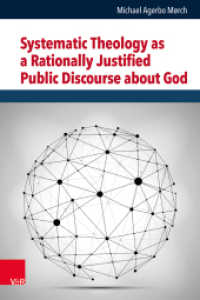Full Description
This book explores how literal notions of touching as well as being touched figuratively can be put to work through thinking-with-touch in early childhood and early childhood studies. Specifically, it examines the stains of developmental psychology and Early Childhood (EC) trajectories that haunt such contexts. In order to explore how students' bodies flow through their studies of early childhood, it also considers how babies and students become-with the Higher Education (HE) classroom, baby-room and worldly materiality; the visible and invisible boundaries that maternal deprivation and attachment theories produce; how developmental theories of psychology are anchored in the policies and practices of EC; and how all that is the discursive, affects-proposing that these explorations have the potential to open bodies towards the precarious landscapes' pedagogues navigate with HE students and the possibility of new ways of being. This book troubles the 'conventional conceptions for how we understand and research' the 'human child in early childhood contexts' through a deep immersion in feminist thinking and the neologisms of spacetimemattering, mothersick, Bowlb(arbar)ian and (gh)host(ile)(ly).
Contents
Crossing the threshold introducing the monograph.- Assembling.- Thinking with touch.- Methodology methods ethics.- Resisting historical norms and repetitions of early chilhood and early chilhood research.- Data threads.- So what.








